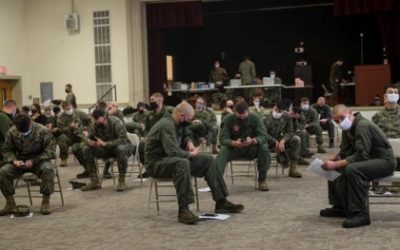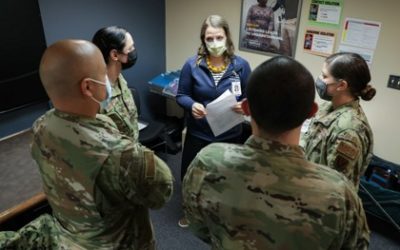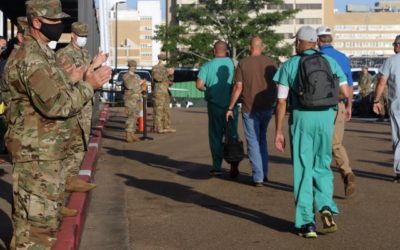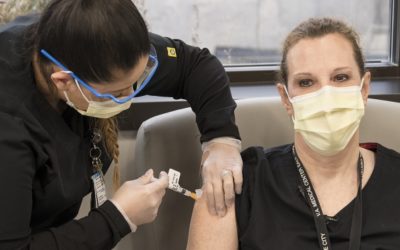VA Secretary Denis McDonough vowed to legislators that the agency will use the lessons it learned during COVID-19 to make the agency stronger going forward.
Military Begins Discharges of Servicemembers Refusing COVID-19 Vaccines
Most active-duty U.S. servicemembers had been vaccinated against COVID-19 by mid-December, when the Army set its deadline.
Premature Cognitive Decline Found in Young Veterans with mTBI
Between 2000 and 2018, approximately 430,000 active-duty servicemembers suffered head injuries.
VA Study: TNF Inhibitors Have Potential Long-Term Effect on Dementia Risk
Alzheimer’s disease (AD) is a global health problem for which there are no disease-modifying therapies.
Military Researchers Strongly Urge Curbing Steroid Use in IBD Patients
Finding alternatives to steroids in treating inflammatory bowel disease has taken on new urgency with the COVID-19 pandemic.
Who Are Homeless Veterans and What Do They Really Need?
This city is home to the largest VAMC in the nation, as well the single largest population of U.S. veterans. Yet about 4,000 of the vets who call Los Angeles home actually have no home.
Which Cancer Patients Get Most Protection From COVID-19 Vaccines?
With new variants popping up and steady occurrence of breakthrough infections, the question of the effectiveness of SARS-CoV-2 vaccination in patients with cancer has not really been answered until now.
DoD Will Provide Medical Workers to Help Civilian Hospitals Fight Omicron
In response to the surge of COVID-19 cases related to the omicron variant, President Joe Biden said that an additional 1,000 military medical personnel would be available to aid civilian hospitals in the United States by early this year.
VA Demonstrates System’s Leadership in Blood Cancers at ASH
VA researchers provided a glimpse of the department’s commitment to addressing blood cancers in veterans and taking a lead in the battle nationally at the 63rd American Society of Hematology Annual Meeting in Atlanta.
ASH: Military Medicine Presents Research on Improving Blood Cancer Care
Scientists from multiple military facilities made significant contributions to the 63rd American Society of Hematology (ASH) Annual Meeting here.
At the VA, the Biggest Challenge to Treating Blood Cancers Is Age
As the nation’s largest healthcare system, the VA treats more individuals with hematological malignancies than any other organization in the United States.
Dinardo Urges VA Physicians to Consider All Possibilities With Diagnoses
A clinician’s mind leaps to a diagnosis. It matches the symptoms; it wouldn’t be that unusual for a patient of that age; it seems the most likely solution to the answers that both veteran and physician are seeking.
VA Played Critical Role in Successful Roll-Out of COVID-19 Vaccines
When the COVID-19 vaccines rolled out last winter, a unique partnership between the VHA and other federal agencies provided the first real-world evidence—outside of clinical trials—of how well the vaccines were working.
The biggest communication problem is we don’t listen to understand; we listen to reply.
As we begin 2022 in federal medicine, I cannot help reflecting on the unprecedented transformational change our society has undergone in such a short period due to the pandemic. Assumptions regarding the workplace, school, social and religious gatherings have undergone a tectonic shift. Could you have imagined worrying about the vaccination status of a family member coming to an event like a wedding or Thanksgiving just two years ago?
OIG: VA Aware of Scheduling System Issues Before Second VAMC Rollout
VA knew of problems with its new scheduling system prior to its implementation at the Chalmers P. Wylie VA Ambulatory Care Center in Columbus, OH, and later at the Mann-Grandstaff VAMC in Spokane, WA, but failed to fix them before going live at the two facilities, according to a report released last month.
Death Rate Increases for VA Patients Lagged Community Levels Last Year
Despite older age and more potentially dangerous comorbidities, veterans receiving VA care fared better last year than those treated in community healthcare systems during the COVID-19 pandemic, according to a new study.
VHA Continues to Provide Too Many Low-Value Prostate Cancer Screening
Low-value healthcare is defined as practices or procedures without clear benefit or where potential harm outweighs the benefit. Deciding what is and isn’t low-value care can be especially difficult when it comes to cancer screenings; increasing age, greater illness burden or lower life expectancy—all weigh on decision-making.
VA Continues to Struggle With Medical/Surgical Inventory Management
VA’s new inventory management system being piloted at the James A. Lovell Federal Health Care Center in Chicago is failing to meet many of the facility’s needs, according to agency overseers.
VA Care Patterns Shifted Dramatically Because of Pandemic, Mission Act
Like other healthcare systems, the VHA has faced unprecedented challenges in responding to the COVID-19 pandemic. A new study provides a broad look at how VA care patterns have shifted since the start of the pandemic.
Nearly All VA Employees Comply with Federal COVID-19 Vaccine Requirements
Nearly all, 98%, of VA employees facing a COVID-19 vaccination requirement have had at least one dose of vaccine or have requested an exception or extension, according to White House data released just before Thanksgiving.
VA Officials Face Hostile Legislators Complaining of Agency’s ‘Broken Culture’
VA has been criticized as suffering from a “broken culture” where employees do not feel comfortable coming forward about safety concerns, resulting in problems going unresolved and tragedies that could have been prevented.
Committee Hearing: DoD/VA Transition Program for Women Not Enough
In recent years, both VA and DoD have worked to create transition services designed specifically for women servicemembers with the goal of providing information about VA care and closing the gap between when a servicemember is discharged and when they enroll for VA healthcare and benefits.
How Solar Activity Impacts Blood Pressure in Older Adults
Hypertension is a known risk factor for cardiovascular disease, the leading cause of death in the United States.
Cytomegalovirus Linked to Airflow Limitation in Smokers
A common herpesvirus infection, cytomegalovirus can have a wide range of symptoms, from no symptoms to fever and fatigue to severe symptoms involving the eyes, brain or other internal organs. It is spread through sexual and nonsexual contact with body secretions.
What Causes Sleep Apnea in Injured Servicemembers?
Even though military servicemembers have few traditional risk factors for obstructive sleep apnea, the condition is prevalent in that cohort.
Early Reduced Airflow Can Predict Later COPD Diagnosis
Can identification of early airflow abnormalities predict future clinically important respiratory-related outcomes, including development of COPD?
Stimulants, Drug Mixes Play Increasing Role in Fatal Overdoses
Fatal drug overdoses have surpassed automobile accidents in recent years as the leading cause of accidental death and, despite efforts to reverse that trend, the number of overdoses is rising.
Sleep, Mental Health Surveys Useful for Seizure Patients
How useful are mental health and sleep screening questionnaires for patients admitted to a seizure monitoring unit?
Housing Insecure Veterans Much More Likely to Have Dementia
Veterans who are at risk of being homeless have significant greater risk of having Alzheimer’s disease and related dementias compared to other veterans.
Predicting MS Development After Optic Neuritis in Military
A new military study looked at how accurately a type of eye inflammation predicts later multiple sclerosis development.








